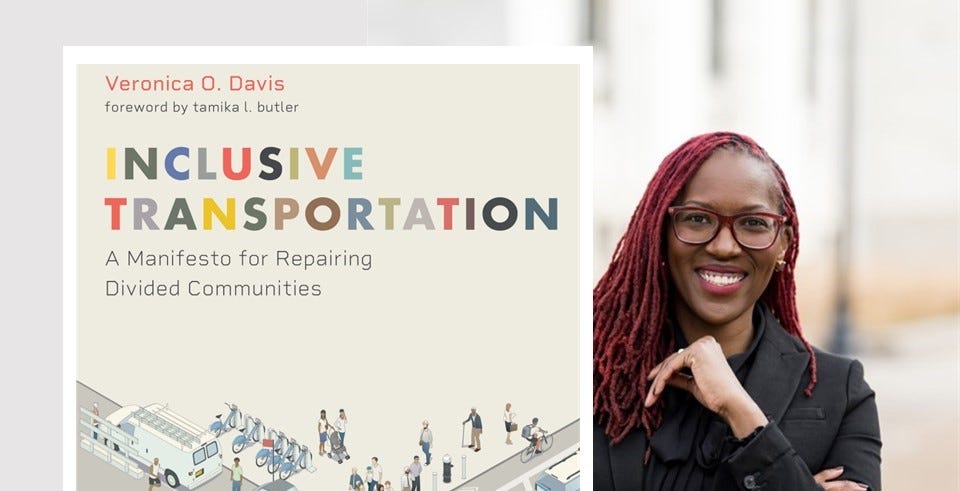Iterate Weekly - Issue 212
This week we're looking at Waymo's new approach to music streaming, the Full Focus Planner, Denver's last mile transit, paying for BART with a credit card, and "Inclusive Transportation"!
Welcome to issue 212 of Iterate Weekly.
Let’s jump into this week’s stories shall we?
Thank you as always for reading!
🖥️ Tech
Waymo gets better music streaming
Whether you want to ride in one or not, it seems like robotaxis are here to stay.
Here in the Bay Area, Waymo is still THE name in autonomous transportation. San Francisco is littered with Jaguar I-Pace EVs outfitted with all the bells and whistles to make them navigate the streets safely under their own power.
And this system has mostly been going well for Waymo passengers. Sure, there have been a few hiccups, but the service has reached a level of maturity in San Francisco. So much so that Waymo recently made a small but welcome change to the in-car experience.
Waymo riders can now easily listen to music on Spotify!
It may sound silly, but a small thing like this can really make or break the experience for a rider. When you are alone in a taxi without a driver, you want to listen to whatever you want. I still have nightmares of taxi and early Uber rides where the driver was blaring some awful pop music or even worse…rush hour shock jock talk radio!
So Waymo riders rejoice! Gone are the days of limited music options or complicated pairing steps. When you enter your ride, your Spotify account should seamlessly sync and you’ll be ready to enjoy a tranquil or exhilarating ride with the proper music (or podcast) to accompany you.
🎓 Productivity/Work/Software/Gear
Full Focus Planner
It has been a while since I’ve written about a daily planner.
And maybe that’s because I haven’t had a whole lot to report on this front. I used to regularly give my take on all of the popular planners available on the market. I think I’ve pretty much used them all at this point.
But like any product, these things get updated. There are slight variations to page layout or changes to the productivity system that corresponds with your planner, etc.
So I’m going back into my archives to dust off an old “Full Focus Planner” that I found in my office. I used it for a bit a few years ago and didn’t love it. Despite that, it has plenty of blank pages that could use filling and I’m willing to give it another shot.
I believe my critique of the planner when I initially used it was that it felt “too corporate” and “not fun”. Those are kinda vague knocks on something that I didn’t use long enough to give a fair shake.
Note that I’m not giving a full endorsement to the whole Michael Hyatt productivity empire here. I have plenty of issues with some of the content he’s put out. (i.e. please don’t assume that the Sunday morning slots in my planner will be filled up for church!)
However, I feel like we all should change up our productivity systems every few months. As we head into a new month and new season, it seems like a good time to refine some of my daily practices. Let’s see if the Full Focus Planner can help.
♻️ Health/Environment/EVs
Denver tries to solve the last-mile transit issue
Even when cities have amazing public transit systems, there is still the hurdle of getting people to and from the actual transit stops.
It’s the “first and last mile” predicament that nearly every jurisdiction has to deal with. Ideally, you want transit stops located close enough to each other so riders don’t have a long way to travel. Conversely, if you offer too many stops, the service becomes bogged down and inefficient.
So any smart transit authority looks to solve this problem. Transit officials in Denver, Colorado are looking to incentivize riders to take free scooter and ebike rides in order to reach their transit stops.
Bike and scooters are the most logical solution to this problem. Plenty of cities offer bike shares or scooter shares around transit hubs. But making them free is a whole different story.
Riders in Denver will be able to take a scooter or ebike up to one mile around two transit stations for no cost at all. It’s a pilot program to see if something like this can significantly increase ridership and eliminate that cost and convenience hurdle of getting to a train station that may be just a bit too far to walk.
As someone who regularly rides an ebike or scooter to the train station, this is a fantastic idea. Sure, there is a pretty significant upfront cost to make these rides free, but in the grand scheme of transit budgets, it’s fairly minimal.
Kudos to Lime and Bird for working with the city and ponying up the funds to make this service free. Let’s hope this works out and other cities follow this same blueprint.
🛍 Grab Bag
Pay your BART fare with a credit card
Let’s keep the transit talk going!
Public transit riders in the Bay Area should be thrilled to hear that you can now ride BART trains by tapping any credit card.
Gone are the days of waiting in line to purchase a paper BART ticket or worrying about how much money is left on that old ticket at the bottom of your bag. Now you won’t miss a train while trying to load funds onto a Clipper Card either. You can just run straight to the turnstiles and tap that credit card on the sensor like you would paying for anything else.
It may sound like a minor thing, but this can be a major hurdle for the casual transit user. People will be far more likely to take a spontaneous ride on BART if they don’t have to worry about finding a Clipper Card or loading the app on their phone, or heaven-for-bid need to print a paper ticket.
This type of thing is commonplace for major transit cities globally, but it’s a big deal for American cities. I know it took a while to get all of the Bay Area transit systems to use the Clipper Card standard, and that’s been great. But if we can get all the trains, buses, and ferries running via credit card, we’ll be one step closer to a transit utopia!
💬 Quote of the Week
"A rich man is nothing but a poor man with money."
-W. C. Fields
📕 Content Review
Inclusive Transportation
Ok, there is clearly a transit slant this week. Not at all planned, but that’s just where my head has been lately I guess.
Last week I finished reading “Inclusive Transportation” by Veronica Davis and I thoroughly enjoyed it.
Sure, this may be a book written for folks working at transit agencies, but I found a lot of value in it as an interested community member.
It’s no secret that transit can be greatly improved in nearly all American cities. But there are too many assumptions that transit agencies make without properly gathering feedback from the entire community. That means people of all ages and abilities when it comes to walking, cycling, and general familiarity with transit systems.
It’s sad to recount the ways that many American cities were divided and reconfigured to make room for freeways and general automobile infrastructure. We can’t erase all of that overnight, but we can build new transit systems in a way that takes all viewpoints into consideration rather than just the ideas of able-bodied folks who ride transit at the same time each day commuting to a 9-5 job.
More people need to read (and write!) books like this if we’re going to improve transit systems in America.
Thanks for reading, I’ll see you next week!
Hey! Could you use some help establishing healthy habits? Do you have a big project or new business that you want to get off the ground but could use some advice? Maybe you could benefit from hiring me as your coach. If you’re interested, read more about my coaching services here, or go ahead and book some time on my calendar to discuss further.
Have you been enjoying my work? Do you want to help support my ability to keep this publication going? Please consider becoming a paid subscriber!





